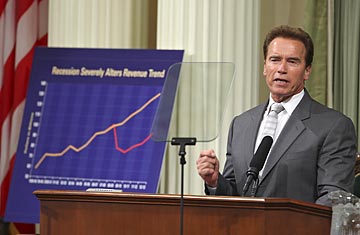
Governor Arnold Schwarzenegger speaks about the budget crisis at a joint legislative session in Sacramento, Calif.
If California voters had any remaining hopes that their state would somehow avoid drastic cuts in government services to help plug a $24 billion budget shortfall, they were surely dashed after Governor Arnold Schwarzenegger's rare midyear appearance before the California legislature Tuesday. Proposing historic cuts in education and social-welfare spending, the governor said, "California's day of reckoning is here ... Our wallet is empty. Our bank is closed. Our credit is dried up."
Two weeks after voters decisively defeated five ballot measures that would have eased the state's fiscal crisis, Schwarzenegger says the message he heard is, "Do your job. Don't come to us with these complex issues. Live within your means. Get rid of waste and inefficiencies. And don't raise taxes." (See pictures of tea-party tax protests.)
In addition to the $24 billion budget deficit, California faces a dangerous cash-flow shortage in the coming weeks. State controller John Chiang has called on the governor and legislature to balance the books by June 15 so the state can, in the midst of a tight credit market, raise the short-term financing needed to fund day-to-day operations in the new fiscal year that starts July 1. Tax receipts in the Golden State have dropped 27% from last year, and without bridge financing, Chiang warns, the state could run out of money by the end of July. (Read Joel Stein on "California's State of Insanity.")
Since the May 19 special election, the governor has proposed cutting public schools' funding by $5.2 billion, closing 220 state parks, firing 5,000 state workers, selling state property and, most dramatically, eliminating the safety net of subsistence economic support and health care to 1 million children living in poverty.
Acknowledging the pain these cuts will cause to million of state residents, Schwarzenegger declared, "We are not Washington. We cannot print money. We cannot run up trillion-dollar deficits. We can only spend what we have. That is the harsh but simple reality."
The Republican governor and GOP legislators say they will not raise taxes, especially after Schwarzenegger and six Republican legislators brokered a budget deal in February that combined deep cuts and $12.8 billion in higher taxes. At that time, the governor said, "We solved $36 billion of a $42 billion deficit," but the continuing economic meltdown has spilled even more red ink.
Schwarzenegger has done his best to make the case that the budget woes are as much "an opportunity to make government more efficient" as a funding crisis, but that is little comfort to average residents. "People come up to me all the time, pleading, 'Governor, please don't cut my program,' " Schwarzenegger said Tuesday. "I see the pain in their eyes and hear the fear in their voice. It's an awful feeling. But we have no choice." (Read "Can Marijuana Help Rescue California's Economy?")
Critics are appalled. "With a reckless cuts-only approach, the governor proposes life-threatening cuts to deny coverage for kidney dialysis, cancer treatments, HIV testing, mental-health care and many other needed services. For over 1 million children, Governor Schwarzenegger would eliminate Healthy Families coverage altogether, leaving those kids and their families at severe medical and financial risk," said Anthony Wright, executive director of Health Access California, a nonprofit advocacy group.
Despite their relatively small numbers in the California legislature, Republicans wield lots of leverage, because both a budget and a tax increase require a two-thirds vote of the Assembly and Senate. Democrats realize raising any revenue will be difficult but still hope to target "sin taxes" and specific business taxes to avoid closing the budget shortfall entirely with historic cuts in services. Assembly speaker Karen Bass, a Democrat from South Los Angeles, says she is optimistic the state can close the budget gap in the next three weeks.
For his part, Schwarzenegger continues to argue that there are smart ways to make the necessary cuts. If the state has to cut billions of dollars from the schools, he argues, why not "give districts more freedom and flexibility"? And with state spending on prisons having nearly doubled in the past five years, the governor believes it is time to follow the lead of other states that have "privately run correctional facilities that operate at half the cost."
